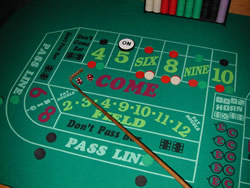- Rolling Dice Casino Game
- Dice Gambling Rules
- Rolling Dice Gambling
- Dice Rolling Online
- Gambling Dice Terminology
Currently, you can’t claim any tax deductions for miscellaneous expenses, such as investment-related costs and unreimbursed employee business expenses. The Tax Cuts and Jobs Act (TCJA) completely eliminates those deductions for 2018 through 2025.
Currently, you can’t claim any tax deductions for miscellaneous expenses, such as investment-related costs and unreimbursed employee business expenses. The Tax Cuts and Jobs Act (TCJA) completely eliminates those deductions for 2018 through 2025.
Nevertheless, you can still deduct certain “other” costs, like gambling losses up to a limit, on your 2020 return. Tax advantage: Under prior law, miscellaneous expenses were deductible only to the extent the annual total exceeded 2% of your adjusted gross income (AGI). But there’s no 2%-of-AGI floor for gambling loss deductions.
Whether you are planning a fundraiser for your organization, a client appreciation dinner for your corporation, a Bar or Bat Mitzvah for your son or daughter, or a surprise birthday party for your spouse in your home, let Tumbling Dice entertain you and your guests with a fun-filled exciting casino. Klondike is a gambling dice game that was popular in frontier America. The game is played with 5 dice that are 6-sided and is like poker dice. The objective in Klondike is to roll a better hand or combination than the banker to win. Gameplay begins with the banker rolling first to establish the benchmark.
Background: For starters you can deduct documented losses from your gambling activities during the year, but only up to the amount of your winnings. For example, if you won $10,000 in 2020 and lost $8,000, you can deduct the entire $8,000 loss. However, if you won $5,000 instead, your loss deduction is limited to $5,000.
The IRS requires you to keep adequate records to substantiate losses and this is a frequent audit trigger. It is advisable to keep a log of your activities, indicating the date of the activity, the location, the names of any people who were there with you, the amounts wagered, the type of gambling and your winnings and losses. Supplement this log with receipts, tickets, statements and forms, etc.
The specific proof required by the IRS varies based on the type of event. Here is a brief rundown on some common gambling activities.

- Bingo and similar games: Keep records of the number of games played, the cost of cards purchased, and amounts collected on winning cards.
- Slot machines: Maintain a record of the machine number and all winnings by date and time the machine was played.
- Casino table games (e.g., blackjack, craps, poker and roulette): Write down the number of the table where you played and any casino credit information.
- Racing (horses, harness, dog, etc.): Keep track of the number of races, the amounts of your wagers and the amounts you won and lost.

Rolling Dice Casino Game
Reminder: Don’t try to pull the wool over the IRS’ eyes. For example, if you hit a big trifecta at the racetrack in the past, the IRS may have challenged your deduction if you offset the taxable income by a slew of tickets for small wagers made on the same day. Similarly, don’t try to fudge records from casinos or online gaming accounts.

Finally, some taxpayers have another ace up their sleeve. If gambling legitimately is your livelihood, you may report winnings and losses from such activities on Schedule C as a self-employed individual, but you can’t claim an overall loss. And you can also write off certain travel expenses and other costs (e.g., subscriptions to gambling magazines) as ordinary and necessary business expenses, although this is also limited to your winnings amount under another TCJA provision. Plus, the value of complimentary rooms, vacations, and other gifts from casinos is treated as taxable income, but may be offset by losses from your gambling activities.
Dice Gambling Rules
In summary: It’s not easy to convince the IRS that you are a professional gambler. Be prepared for some pushback. And the IRS usually prevails in court in these types of cases, so consider the high odds against you.
Gambling and ADHD: What to Watch for When Rolling the Dice

- A need to gamble with an increasing amount of money to get the same level of excitement.
- Feeling restless or irritable when he doesn’t gamble, or does less of it.
- Unable to cut back or stop gambling, even when he tries.
- Thinks a lot about gambling, remembering good experiences and planning how to succeed at gambling in the future.
- Gambles to relieve stress, anxiety, depression, or guilt.
- Chases losses, which means gambling more after losing to try and make up for the loss.
- Has lost a job or significant opportunity or had a relationship end because of gambling.
- Asks other people for money to clear up financial problems that were caused by gambling.
Rolling Dice Gambling
Dice Rolling Online
- National Problem Gambling Helpline Network. Call them at 1-800-522-4700.